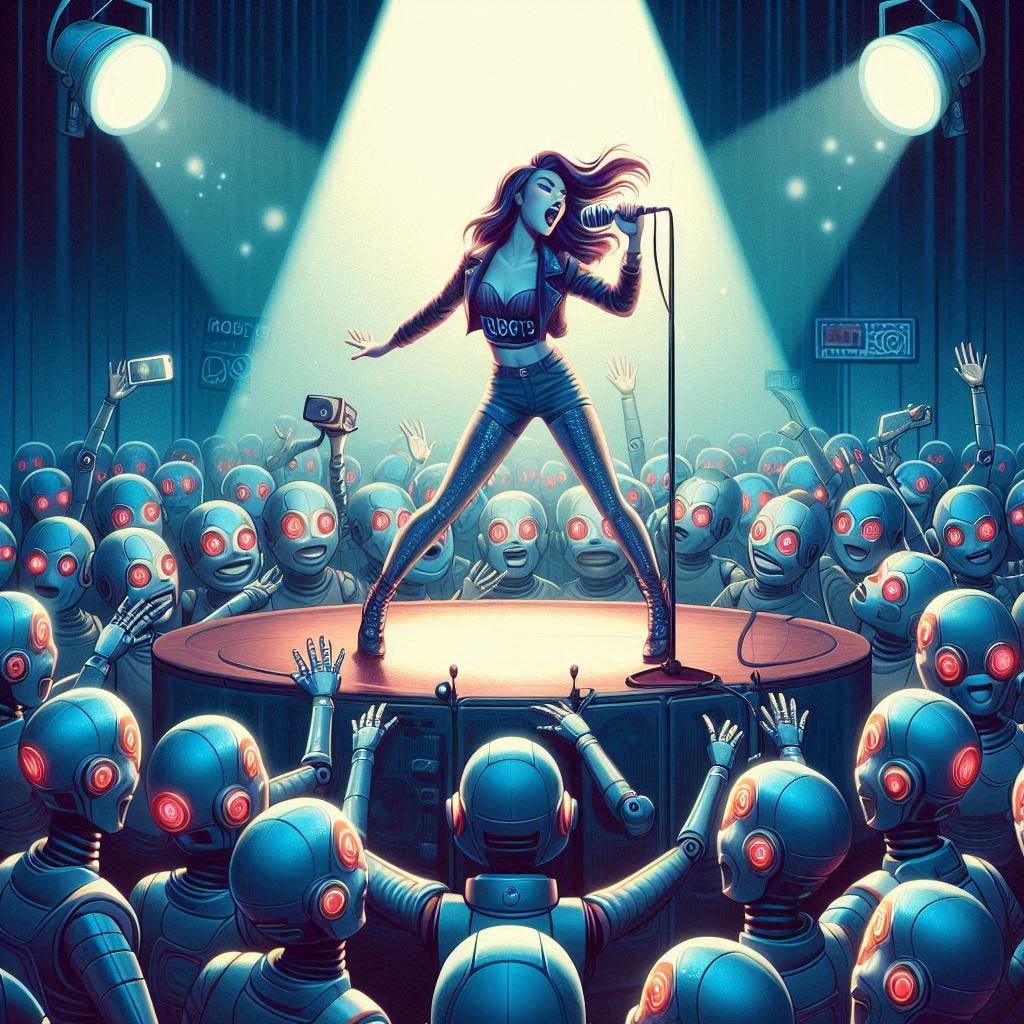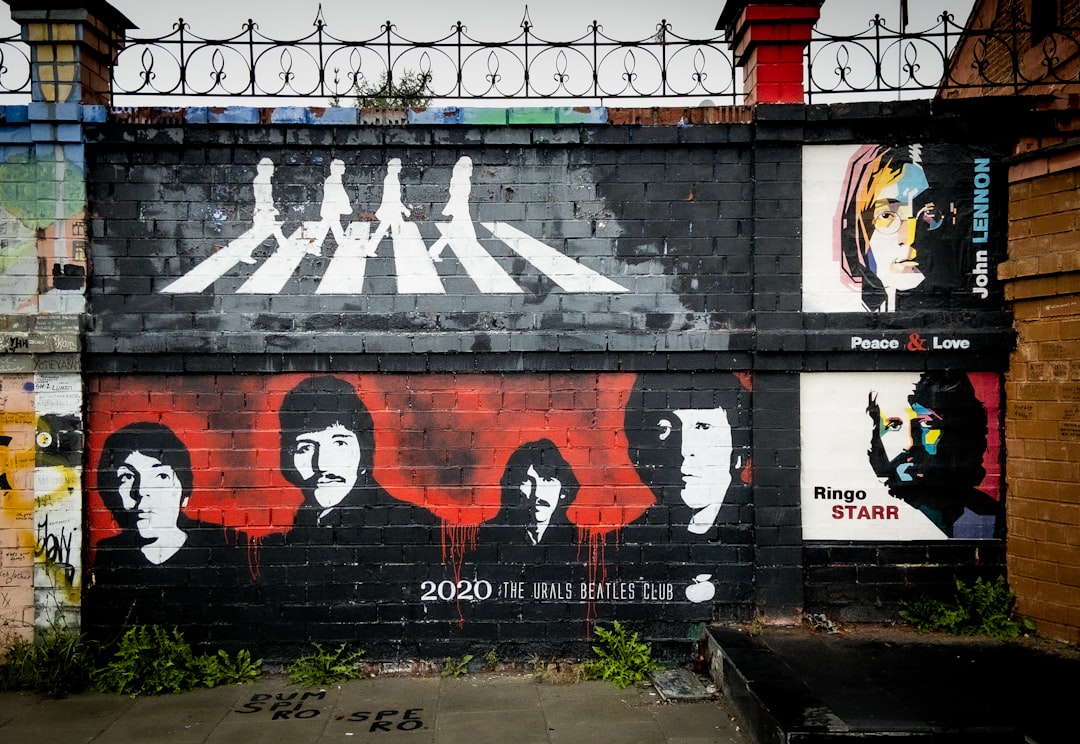The Songs Sound Better When You Don't Understand the Lyrics
Hi-tech production and marketing magic cover a multitude of artistic sins ...

Upon seeing the coruscating electric lightshow of Times Square in 1921, G. K. Chesterton remarked, “How beautiful it would be for someone who could not read.”1 If you didn’t know what all the brightly lit signs actually said, then you might have guessed that some urgent and glorious news was being announced, when in reality it was just a lot of silly slogans advertising products like toothpaste and razors.
The way Chesterton felt about Times Square is similar to how I feel about popular music: much of it would probably sound a lot better if you didn’t understand English.
Probably the most extreme example of this would be The Doors and their melodramatic singer, Jim Morrison, whose “poetry” is full of sound and fury, signifying nothing.
Hey, let’s take a brief break and do a quick survey! Which sounds more aesthetically pleasing to your ear? Jim Morrison singing a capella?
Or Tom the Cat screaming?
The phenomenon of beautiful-sounding music being paired with cartoonishly vapid words was perfectly parodied in the movie This Is Spinal Tap (of course, this was back when music was actually made by real musicians, not computerized programming, so Spinal Tap would have been a step up, creatively, from many of today’s most popular musical acts):
And then there are bands in the tradition of GWAR and Electric Six where the over-the-top absurdity of the lyrics is all part of the fun:
Anyway … pompous posers like Jim Morrison (and the fun-loving musical trolls that parody them) aside, most popular singers don’t even pretend that their words are meaningful, especially in the post-hip hop era. The music may sometimes sound glorious or elegant or celebratory or what not, but the lyrics are as shallow and stupid as the advertising slogans Chesterton saw on display in Times Square.
For that reason, I have no desire to learn the English translations of songs sung in other languages. Nena’s 99 Luftballons sounds like it could be lyrically meaningful (and to be fair, it probably is), but I don’t want to see an English version of the lyrics (nor listen to the English version of the song), for fear that I may discover that she’s actually singing about all the helium-filled balloons she saw at the grand opening of a local shopping mall, or at some stupid kid’s birthday party she attended, or at the Cleveland balloon disaster of 1986 (although that last possibility would be kind of cool, since 99 Luftballons was recorded three years before the Cleveland balloon debacle, which would make Nena a time-traveler or a fortune-teller to have accurately predicted it). Maybe I’m missing out by not knowing what the words mean, but I have an impression of what 99 Luftballons is about from the way it sounds, and I don’t want to potentially mess that up by discovering that the reality doesn’t live up to the hype.2 Same thing with Falco’s Rock Me Amadeus or Rammstein’s Du Hast: I’d rather not know what the lyrics mean, if that would risk undermining the favorable impression I have of those songs.
Back to G. K. Chesterton: I was reminded his remarks about the Times Square signage when I watched a recent video from Rick Beato where he analyzed the current top ten songs on Spotify. I watched the video expecting to be annoyed and disgusted by nonstop trap beats and autotune, but I was pleasantly surprised: no trap beats, and only one of the songs really went over the top with autotune. While none of the songs were great, a couple of them weren’t half bad. In the case of the top song on the countdown, Espresso by Sabrina Carpenter, the song would have sounded okay if (and only if) you didn’t understand English. Musically, it sounded lighthearted, fun, and hopeful; lyrically, it was dark, depraved, and demonic. It was a worshipful artistic offering in honor of an ego so large that it could make even Lucifer jealous that anyone else could have such an inflated sense of self importance.
One thing that’s obvious from this video: 80s nostalgia is all over mainstream culture, which makes sense. With a few, relatively short-lived exceptions (like the Seattle grunge sound of the 90s), popular culture has been going pretty steadily downhill since the 80s. It’s not that there haven’t been talented musicians making great music and exploring interesting combinations of sounds and styles; it’s just that the cultural “gatekeepers” — and yes, gatekeepers are still very much with us, even in today’s internet/streaming era, though their influence is more hidden than it used to be, such that it would be more accurate to call them “astroturfers” than “gatekeepers” — have successfully sidelined creative artists in favor of unimaginative hacks, who are easier to manage and commoditize.3 For the most part, whenever anyone is truly creative and consumed by a real artistic vision, he or she is kept far away from the popular mainstream. When it comes to the most commercially successful performers, they, at their best, do little more than formulaically recycle what has already been done — and been done better — by the artists of bygone eras.
Espresso by Sabrina Carpenter — who is yet another Disney/Nickelodeon child actor turned pop singer, and if there’s one thing our culture desperately needs, it’s another one of those!4 — was the top song in the countdown. Espresso perfectly embodies that recycled 80s sound. But here’s the thing: it wasn’t just the music that was straight outta 1985; it was also the lyrical content.
Me, me, me! “Look on my Public Image, ye Mighty, and despair!”5 The yuppie egomania and endless consumerism — a lifestyle tailor-made for the hedonic treadmill — on full display in all its narcissistic glory. Now where have I seen that kind of shameless egoism before? Oh yeah, Madonna! And now, ladies and gentlemen, the hoe-ification of popular music, that Madonna kicked off in earnest 40 years ago, has finally reached full fruition. Today, it seems that every single female singer who gets anywhere near the top of the charts has 100% fully and completely embraced the Material Girl ethos.
Here’s Bart Simpson doing his version of the just do you, bad boss-bitch, yasss Kweeen, endlessly-entitled egomania that has subsumed the mainstream culture of the Globohomo American Bankster Empire:
If Sabrina Carpenter6 had sung her song in Italian or French, I could have enjoyed listening to it. It’s got a catchy melody and enough of an 80s vibe to feel instantly familiar. It sounds like a fun, carefree, party song. If she had sung those verses in an unfamiliar (to me) language, I would probably not have imagined that the words were at all meaningful, but I would not have known just how vapidly narcissistic they really were.
Madonna started the trend of giving Aleister Crowley’s satanically egoic nihilism an attractive veneer of feminine mystique and seduction (when she was young; now that she’s old and her physical beauty has shriveled and died, she perfectly demonstrates the dark and depressing reality that the moralists of bygone eras warned us about7). Rappers and post hip-hop-era R&B singers carried Madonna’s torch and burned down the few remaining cultural norms that used to restrain unabashed self-worship. Carly Simon once sang “You’re so vain, you probably think this song is about you. Don’t you? Don’t you?” Today’s female pop stars sing, “I’m so vain, I’m making all my songs just about me! Watch me! Watch me!” And whereas Madonna (in the 80s) was at least physically fit and attractive, today’s singers (like Lizzo) demand to be considered beautiful at any size (i.e., no matter how disgustingly fat they are).8 We have just about reached the bottommost depths of brutish banality where the 60s cultural revolution was bound to end up.
The old-fashioned love songs were mostly silly, but at least their singers were (for the most part) extolling the virtues of someone besides themselves. Another 80s megastar, Whitney Houston9, wasn’t some incredible poetess, but unlike Madonna, her songs were at least focused outwards, rather than on celebrating only her own vanity. Even when Houston sang about her own feelings and desires, it was always in the context of her relationships with other people, who were presented as real people with their own real feelings and desires, rather than (as often happened in the case of Madonna) as one-dimensional cardboard cut-out simulacra of human beings, who served only to flatter the singer’s ego (and who would be jettisoned from her life as soon as they stopped slavishly worshipping her).
Much of today’s popular music is just like the brightly lit signs of Times Square that Chesterton so accurately summarized in a single sentence: “How beautiful it would be for someone who could not read.” The form might have a certain beauty to it, but the substance is empty, soulless, and trite. But at least the Times Square lights of 1921 were advertising useful things like toothpaste and shaving razors. Today’s pop songs advertise only the singers’ own narcissism. How much better those songs would sound if you couldn’t understand the words!
The Cross in Times Square | Dominic Verner | First Things: https://www.firstthings.com/blogs/firstthoughts/2013/06/the-cross-in-times-square
In this way, I am behaving like a Leftists: I have a mental model that I like, so I avoid any possibility of encountering evidence that may disconfirm my mental model. In this case, my mental model concerns the artistic merit of a West German pop song from the 1980s, so my private belief bubble won’t affect anything in the “real world.” With Leftists, well, the stakes are slightly higher, and they tend to insist that the entire country share their luxury beliefs, no matter the cost.
In case you’re interested in my theory about why there was so much creativity and talent unleashed in popular music during the 1960s, and why that trend has reversed in the decades since, check out:
Why Popular Music Peaked in the 1960s
I have a theory about why popular music peaked in the 1960s and has been in decline ever since, with an especially precipitous drop-off in quality around the mid-1990s. I don’t have anything like the technical knowledge or training of a Rick Beato or
At least Ozymandias (by Percy Shelley) was proud of his works, rather than merely being proud of his public image:
I met a traveller from an antique land,
Who said—“Two vast and trunkless legs of stone
Stand in the desert. . . . Near them, on the sand,
Half sunk a shattered visage lies, whose frown,
And wrinkled lip, and sneer of cold command,
Tell that its sculptor well those passions read
Which yet survive, stamped on these lifeless things,
The hand that mocked them, and the heart that fed;
And on the pedestal, these words appear:
My name is Ozymandias, King of Kings;
Look on my Works, ye Mighty, and despair!
Nothing beside remains. Round the decay
Of that colossal Wreck, boundless and bare
The lone and level sands stretch far away.”
Since I inflicted the soulless sounds of Sabrina Carpenter on you, here is a different Carpenter, the one and only Karen, with sublime vocals and meaningful lyrics (plus the ability to play a musical instrument while singing onstage, instead of just doing a choreographed hoochie-mama dance while singing karaoke over pre-recorded music, like Sabrina Carpenter and her ilk):
How fat is Lizzo? Lizzo is so fat, you could make an entire outfit for a normal size woman out of just the lint in Lizzo’s navel. Now that is fat!
My post about Whitney Houston and what it means to “pay attention” to someone’s image:
American Idolatry
I recently watched the movie version of Whitney Houston’s life, I Wanna Dance with Somebody, and it left me wondering who, or what, Whitney Houston really was. Not the person, but the public image, which was incredibly culturally successful as a brand. That public image was conveyed via millions of screens into millions of minds. Who or what did that image — does that image — really represent?










Nothing like having children to make you actually listen to song lyrics. I have yet to find more than a handful of songs I remember from my childhood that I'm comfortable playing for my toddlers. Family friendly they ain't. I think it's an under-appreciated cause (or at least a symptom) of our cultural decline.
I haven't listened to any "pop" music in at least a decade, but I can't imagine the situation has improved.
Clear Channel destroyed local radio.
Reagan damaged the college party scene by raising the drinking age.
Ergo, not as much farm teams as in the old days.